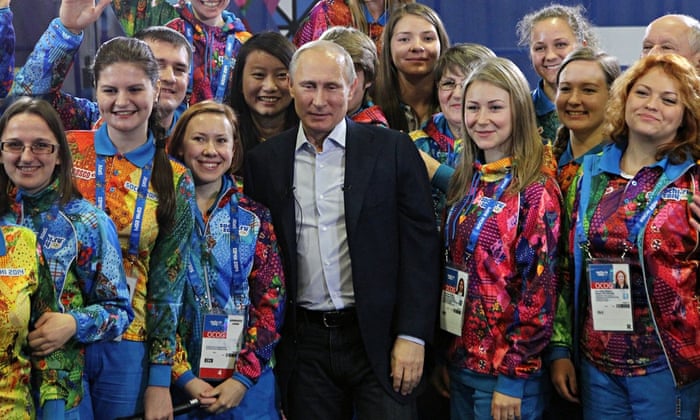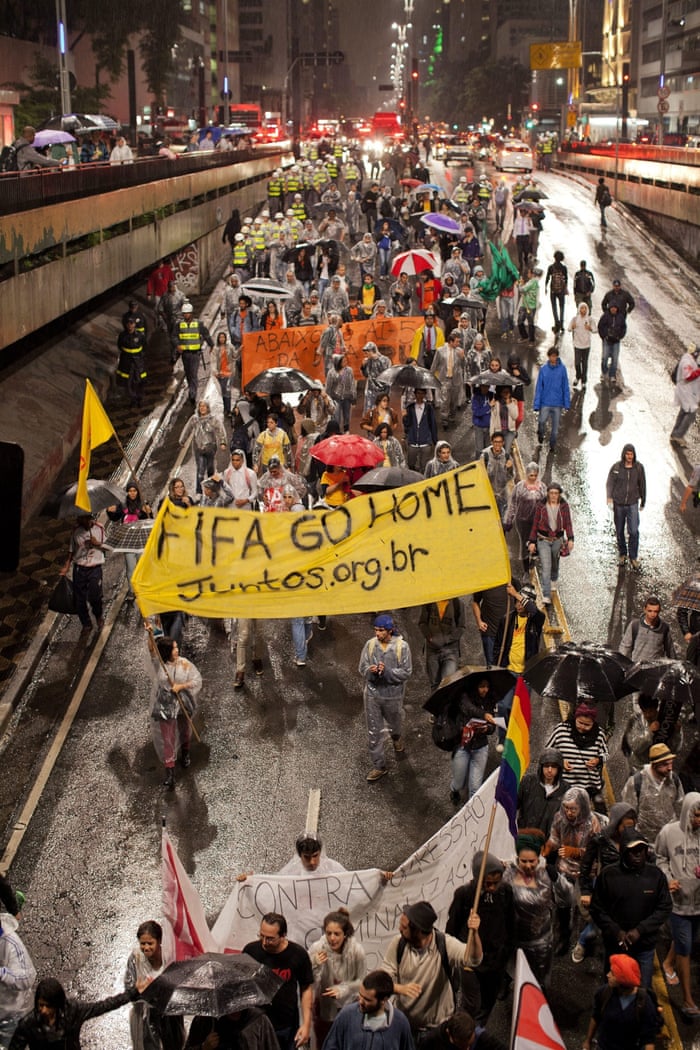
Apart from war, nothing so deranges the political mind as national sports rivalry. It stirs patriotism, ostentation and group hysteria. In Britain, its participants are accorded the status of quasi-military heroes. At the apex of this derangement stand two so-called mega-events, the Olympic Games and football’s World Cup. Politicians will beg, bribe, cheat, lie and spend unlimited sums of taxpayers’ money to “win” a hosting of these contests.
Andrew Zimbalist is a sports economist, though I wonder if he has not abandoned that profession, in despair, for behavioural psychology. The focus of his interest is not so much the host countries, which he portrays as desperate victims of some curse, gripped by lust for glory and immune to debt. Rather, he is mesmerised by their oppressors, the International Olympic Committee (IOC) and Fifa, self-perpetuating cabals of Swiss-based bureaucrats, who live fat on six-figure salaries, colossal expenses and unbounded arrogance. They travel the world like princes, playing on the weakness of democrats and dictators alike. With each event, they demand more venues and more costs. The IOC’s boss Juan Antonio Samaranch was understandably addressed as “your excellency”.
When London was awarded the 2012 Games, it paid $500,000 in fees to the IOC just to bid. The British government then increased a customarily understated budget of £3bn to more than £9bn. The IOC demanded London build a new, fortified city at Stratford, despite the new Wembley having been designed for the purpose. The so-called Olympic “family” required five-star hotels and fleets of limousines, roads to be cordoned designated for their private use, including a “Zil lane” past Harrods, and traffic lights that turned green on their approach.
Parliament had to pass a law placing the police and regulators at the IOC’s disposal. The IOC was excused all local taxes and its sponsors were not to suffer rival products advertised anywhere within sight – not so much as the name of a loo seat. The army was put on standby, with missile launchers and submarines at the ready. London’s mayor, Boris Johnson, told his citizens to stay off the tube lest they impeded Games visitors. Tourist sites emptied. Such nonsense is not even offered to a visiting head of state. Yet the government dared deny the IOC nothing.
Britain, like other host nations, went into banana republic mode. The BBC turned soft in the head, its presenters screaming at every medal like Stalinist sycophants. Newspapers abandoned all news judgment for the duration. Critics were treated like conscientious objectors during the Great War, wimps who could not stand the sight of weapons of mass expenditure.
When the IOC and its grubby younger sister Fifa were founded in 1894 and 1904 respectively, they were dedicated to international concord and amateurism (not yet a term of abuse). They went along with Hitler’s transformation of the 1936 Olympics from the cause of internationalism to that of nationalism, and never looked back.
Zimbalist shows how, by exploiting television and product sponsorship, the IOC and Fifa turned the contests into primarily commercial events. They were soon in thrall to the big venue contractors (mostly American). The Games became essentially a tax on nation states, with profit going to contractors and the IOC and Fifa themselves. In the 1960s the IOC was still taking just 5% of the Games’ rights revenue. It nowadays pockets more than half, usually leaving the host nations crippled with debt.
By the 1970s, the Olympics were assailed by political boycotts, drug scandals and the near bankruptcy of Montreal in 1976. For the 1984 Games, says Zimbalist, “the brand was so markedly tarnished” that the only bidder was a private syndicate from Los Angeles, offering to rent the city’s existing facilities. They did so and made a fortune.
Los Angeles was an elixir for the IOC. Amateurism was abandoned, a blind eye was turned to doping and ever more rights revenue was skimmed from host cities and sporting committees. Then in 1992, Barcelona offered to locate its Olympics in a rundown part of the city, thus declaring the Games primarily a “legacy”. Los Angeles and Barcelona saved the Games. To all complaints over costs, the IOC now refers to the Olympics as “a huge sporting, economic and social legacy”.
Zimbalist shows such claims to be rubbish. Los Angeles and Barcelona were exceptions, in that sporting events were adapted to suit the host city, rather than vice versa. The economic multiplier of these mega-events is proven false. City or state GDP does not increase. Tourism does not rise during the contests. The 2000 Sydney Olympics led to a four-year fall in numbers, and Beijing 2008 saw a collapse in visits. The British government hired bevies of accountants to claim that the 2012 Games would make a profit, “earn Britain £13bn in extra trade” and “deliver a tourism boost”. They did nothing of the sort. The stadiums were to be dismantled and reused elsewhere – they were not.
 Most gratuitous have been the white elephants. Athens now has more Olympic ruins than classical ones, with 21 out of 22 structures erected for the 2004 Games standing derelict. The debt undoubtedly contributed to the country’s economic collapse. The demand of the IOC for “gold-plated” stadiums has left cities from Atlanta to Barcelona, Beijing and London with near unusable monoliths. Some cities may see a one-off boost to transport infrastructure, but as Zimbalist comments: “Why should it be necessary to spend tens of billions of dollars to host an event to get hundreds of millions of dollars of worthwhile investment?” Instead the world is littered with empty velodromes, kayak runs, beach volleyball stadiums, speedskating ovals and bobsled tracks.
Most gratuitous have been the white elephants. Athens now has more Olympic ruins than classical ones, with 21 out of 22 structures erected for the 2004 Games standing derelict. The debt undoubtedly contributed to the country’s economic collapse. The demand of the IOC for “gold-plated” stadiums has left cities from Atlanta to Barcelona, Beijing and London with near unusable monoliths. Some cities may see a one-off boost to transport infrastructure, but as Zimbalist comments: “Why should it be necessary to spend tens of billions of dollars to host an event to get hundreds of millions of dollars of worthwhile investment?” Instead the world is littered with empty velodromes, kayak runs, beach volleyball stadiums, speedskating ovals and bobsled tracks.
Fifa demands eight state-of-the-art stadiums for each World Cup, sometimes used for just half a dozen matches each. South Africa and Brazil nurse at least six stadiums that cost hundreds of millions of dollars and are now abandoned. Two in South Africa, at Mokaba and Mbombela, may be demolished. Fifa boasts “they provide many benefits for local communities and enhance community pride”. This, says Zimbalist, is “fanciful nonsense”.
After riots broke out in Brazil in protest against waste on mega-events, a Fifa official blandly remarked that “less democracy is sometimes better for organising a World Cup”. Hence Fifa’s 2010 decision to award the World Cup to Russia, and then Qatar. Only the British press revealed the corruption behind the decision, an accusation to which Fifa’s ruling regime, headed by Sepp Blatter remained wholly immune. These people are accountable to no one but “sport”.
Putin’s spending of more than $51bn on the 2014 Sochi Winter Olympics dwarfed even Beijing’s $40bn on summer 2008. Zimbalist recounts the oligarchic chicanery and racketeering involved. The Russian ruler’s vanity is now incurring even higher costs for the 2018 World Cup. (If western leaders wanted to hurt Putin, they would boycott that event, but their vanity is the equal of his.)
Zimbalist has no answer to all this beyond a resigned shrug. For next year’s Rio Olympics, that impoverished city must find more than $14bn in costs for two weeks of elite sport. It will receive a mere $1.5bn out of some $5bn in expected rights revenue, the rest vanishing into the “expenses” of the IOC. The Olympics have become a straightforward rip-off. But as long as politicians exult in the glory of a brief sojourn in the world spotlight, there is no remedy. Rio’s favelas will gaze down at the passing cavalcade and be told to marvel at the honour done them – and pay up. Soon, however, this will be a game only dictatorships will play.
Fuente: www.theguardian.com